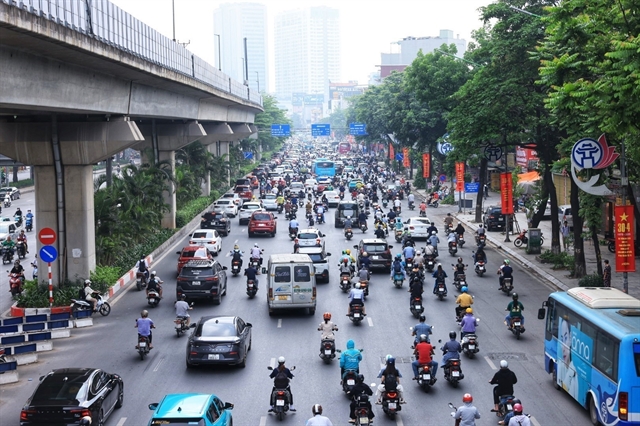 Environment
Environment

 |
| Traffic at Sở Intersection, one of the busiest locations in Hà Nội. — VNA/VNS Photo |
HÀ NỘI — Hà Nội's municipal authorities held a working session on Monday with the Việt Nam Association of Motorcycle Manufacturers (VAMM) to discuss solutions for transitioning motorbikes and mopeds away from fossil fuels in the capital.
Speaking at the meeting, Chairman of the Hà Nội People’s Committee Trần Sỹ Thanh expressed appreciation for VAMM’s remarks and proposals, which aim to improve policy implementation related to motorcycles generally and electric motorcycles in particular in Hà Nội.
"The issue of motorcycles can be viewed from different angles," he said.
"But a modern and civil urban centre is impossible without a good environment and culture."
Currently, the growth of motorcycles presents a major challenge for the sustainable development of cities, despite the convenience they offer, Thanh added.
Since 2017, the Hà Nội People’s Council has issued Resolution No.04 approving the scheme titled 'Strengthening the management of road traffic vehicles to reduce traffic congestion and environmental pollution in Hà Nội for the 2017–2020 period, with a vision to 2030'.
As such, Thanh said restricting motorbike use should not come as a sudden or unexpected decision for residents or businesses.
In light of this reality, he stated that the Hà Nội authorities will proceed with the plan to limit motorbike use in four central urban districts, with carefully considered and specific steps.
The Chairman of Hà Nội said the city will continue to consider an appropriate timeline for implementing the resolution of the People’s Council, but it cannot be delayed for too long.
“We are aware that motorbikes are not the cause of every problem, but they are a contributing factor to many social and urban cultural issues. This affects not only individual convenience but also the shared living environment of the community,” the Chairman of Hà Nội said.
However, Hà Nội's leader also acknowledged that motorbike use has, in fact, become a cultural feature of Việt Nam. Therefore, the transition away from fossil fuel-powered motorbikes must follow a clear and gradual roadmap.
“However, without strong determination, Hà Nội may never reach the level of civilisation and beauty seen in major cities in Japan and around the world,” he said.
Many countries, including Japan and EU member states, are currently supporting Hà Nội in developing its public transport systems. Under the 2030-35 strategic plan, the city aims to establish around 10 urban railway lines.
In her report, Sayaka Arai, Chair of the VAMM and General Director of Honda Vietnam, stated that VAMM was established in 2013, with members including Honda Vietnam, Yamaha Motor Vietnam, SYM Vietnam, Suzuki Vietnam, and Piaggio Vietnam. VAMM’s mission is to connect motorcycle manufacturers in producing high-quality, safe, environmentally friendly products.
Additionally, VAMM acts as a bridge between businesses and the government, helping to shape policies and support the development of the motorcycle industry and broader society. Beyond its social contributions, VAMM contributes around VNĐ20 trillion (US$767.9 million) annually to the state budget, maintains a wide-reaching supply chain of about 2,000 dealerships and 200 parts suppliers, and creates stable employment for over 200,000 people.
During the session, on behalf of VAMM members, Arai proposed several measures for transitioning away from fossil fuel-powered motorcycles in Hà Nội. Specifically, she recommended that the city promote the production and use of cleaner petrol-powered vehicles by limiting fuel consumption, enforcing EURO4 standards, encouraging biofuels, and tighteninging controls on in-use vehicle emissions.
Regarding electric vehicles, VAMM proposed that the city adopt a feasible and realistic roadmap for the transitioning, ideally starting as early as 2030.
Arai emphasised that the shift from petrol to electric vehicles is a major policy decision that affects many stakeholders. Therefore, VAMM recommended that the Government and Hà Nội authorities should engage in broader consultations with all relevant parties to make well-informed decisions. She also noted the need for a thorough assessment of the air pollution levels caused by petrol vehicles to evaluate the effectiveness of electric vehicle policies.
“To transform Hà Nội into a more civilised and modern city, VAMM is committed to supporting the city with the most effective solutions to ensure urban development that is both cleaner and more convenient for residents – especially as it formulates the roadmap for transitioning fossil-fuel motorcycles, including electric motorbikes,” the VAMM leader said. — VNS




